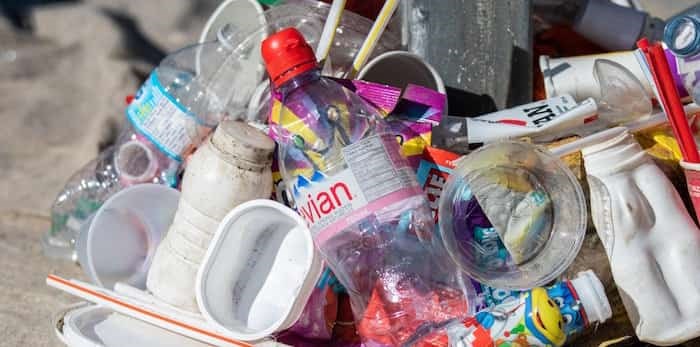 Photo: @greenpeaceca / Twitter
Photo: @greenpeaceca / Twitter
Greenpeace Canada has released its annual list of the top five plastics polluters, and Tim Hortons and Nestlé ranked in the top two spots for the second year in a row.
The environmental organization identified 240 companies in the 2019 branded plastic pollution audit. This year, 39 per cent of the pollution belonged to the top five polluters. In fact, Nestlé accounted for roughly 12 per cent of the branded plastic while Tim Hortons accounted for about 11 per cent.
Starbucks ranked in 3rd this year, followed by McDonald’s in 4th. The Coca-Cola Company rounded out the list in 5th.
In addition, house brand-labelled products by Canada’s major retailers were found among the polluting items, such as: Sobeys, Costco, Walmart and Loblaw.
Greenpeace Canada notes that the ranking order did vary from location to location, but that Tim Hortons placed in first in six of the nine locations.
The most commonly collected single-use plastic item categories were: (1) cigarette butts, (2) bottles and caps, (3) wrappers, (4) cups and lids, and (5) straws and stir sticks. Bags, cutlery and other forms of packaging also placed in the top 10.
“Canada’s top plastic polluters are once again the usual suspects. Polluters like Nestlé and Tim Hortons are continuing to shift responsibility on consumers, instead of fixing their own broken business models,” said Sarah King, Head of Greenpeace Canada’s Oceans and Plastics Campaign.
“Companies’ responsibility doesn’t end at the point of sale. It’s time these polluters got honest with their customers about the scale of their plastics problem and made a real commitment to solve it through ditching disposables and embracing reuse.”
The organization adds that it also found plastics that are recyclable, contained recycled content or bio-based material during cleanups. Specifically, they found paper straws, compostable packaging and bio-plastic bags, and these were found in the environment in non-biodegraded states. What's more, all companies that ranked in the top five, "have noted recyclability, recycled content, use of bio-based or paper alternatives as alleged solutions to their plastic footprints."
The audits, which consist of separating the plastic pollution found by type and then the company responsible for producing it, were conducted at nine locations across Canada. There were a variety of group sizes for the cleanups, as well as the scope of the audits. While some were quick cleanups by a participant or two, others were multi-hour community events. The cleanups and audits varied in size and scope, from rapid cleanups with one or two participants to multi-hour community events.
Overall, more than 400 volunteers participated in collecting or auditing the trash found.
Greenpeace Canada is calling for a nation-wide ban on the single-use plastics that are regularly found in the environment, known to be toxic, end up landfilled or burned despite recyclability claims, and that have existing alternatives. The organization is urging corporations and governments to invest in solutions focused on reuse.


